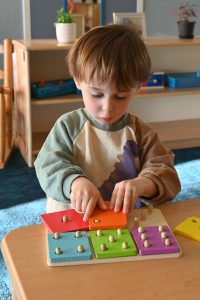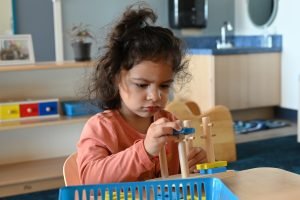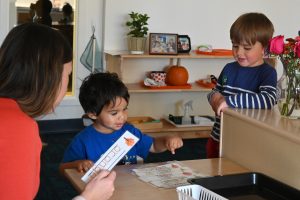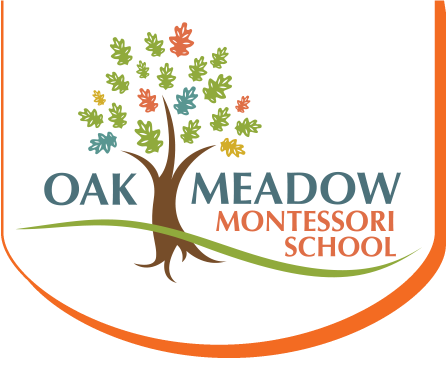 Stopping by the Beginners classrooms (our toddlers) this week, I observed students busily engaged. They were using tools to figure out how pieces fit together… assembling puzzles… matching colors and images… tipping colored cotton balls out of a glass bottle with a small-mouthed neck and then putting them back… using kitchen tongs to move small plastic pumpkins from a basket to the muffin tin, carefully inserting only one pumpkin per cup… pasting colored tissue on paper leaves to create a beautiful mural… walking through the carefully planned sequence for washing hands — turning on the water, rinsing hands, using soap, rubbing hands together, turning off the water, wiping hands with a paper towel, putting the paper towel in the wastebasket… And of course the list goes on.
Stopping by the Beginners classrooms (our toddlers) this week, I observed students busily engaged. They were using tools to figure out how pieces fit together… assembling puzzles… matching colors and images… tipping colored cotton balls out of a glass bottle with a small-mouthed neck and then putting them back… using kitchen tongs to move small plastic pumpkins from a basket to the muffin tin, carefully inserting only one pumpkin per cup… pasting colored tissue on paper leaves to create a beautiful mural… walking through the carefully planned sequence for washing hands — turning on the water, rinsing hands, using soap, rubbing hands together, turning off the water, wiping hands with a paper towel, putting the paper towel in the wastebasket… And of course the list goes on.
Beyond just being busy, however, there is so much more happening, so much real learning. In Beginners, the materials are designed to develop skills in language, concentration, problem solving, visual discrimination, and physical coordination. They promote independence, order, coordination, and concentration, as well as emotional, physical, and cognitive development. Fine motor skills include reaching, grasping, picking up objects, transferring objects, and using tools.
 Students are also developing the early habits of adopting a mastery-based approach to learning. The teacher knows each student, and also knows how to challenge students to stretch beyond their comfort zone (what they already know) in order to develop new knowledge and skills. Students select from materials they know how to use. They practice over and over to master the concept involved. The materials are “self-correcting” so students receive instant feedback on the success of mastering the concept. Because students have a choice in the material selected, and experience the gratification of success, they become self-motivated to do better and ultimately to master the particular concept being learned. Teachers are constantly observing each student, assessing their progress, and providing new materials to foster growth. Children advance at their own pace and feel a genuine sense of success in school as they make progress and get helpful feedback and direction from the teacher.
Students are also developing the early habits of adopting a mastery-based approach to learning. The teacher knows each student, and also knows how to challenge students to stretch beyond their comfort zone (what they already know) in order to develop new knowledge and skills. Students select from materials they know how to use. They practice over and over to master the concept involved. The materials are “self-correcting” so students receive instant feedback on the success of mastering the concept. Because students have a choice in the material selected, and experience the gratification of success, they become self-motivated to do better and ultimately to master the particular concept being learned. Teachers are constantly observing each student, assessing their progress, and providing new materials to foster growth. Children advance at their own pace and feel a genuine sense of success in school as they make progress and get helpful feedback and direction from the teacher.
 We are seeing a new interest in mastery-based learning (or competency-based learning) among many schools today, because it is far better aligned with positive student self-image and confidence, and it empowers students to take ownership of their own learning. Mastery is not new in Montessori, however. Developing clear learning goals or targets for each student, and then working backwards “with the end in mind,” is inherent in Montessori philosophy.
We are seeing a new interest in mastery-based learning (or competency-based learning) among many schools today, because it is far better aligned with positive student self-image and confidence, and it empowers students to take ownership of their own learning. Mastery is not new in Montessori, however. Developing clear learning goals or targets for each student, and then working backwards “with the end in mind,” is inherent in Montessori philosophy.
Here’s how we define mastery as one of the six primary components of our North Star, our differentiator for teaching and learning:
Develop a mastery orientation. Students become intrinsically motivated, life-long learners, by adopting a mastery orientation; focus their attention on their own continual growth (a growth mindset and not the anxiety of perfectionism); celebrate and learn from peer accomplishments rather than measuring themselves against others; learn from their own mistakes; become resilient in overcoming obstacles and challenges; and demonstrate high competencies, proficiencies, self-confidence, and skills (academic, social, emotional, and practical) through repetition, practice, and demonstrated achievement.





